Adaptogenic Herbs in TCM: Navigating Stress and Hormonal Balance for Advanced Acupuncturists and Herbalists
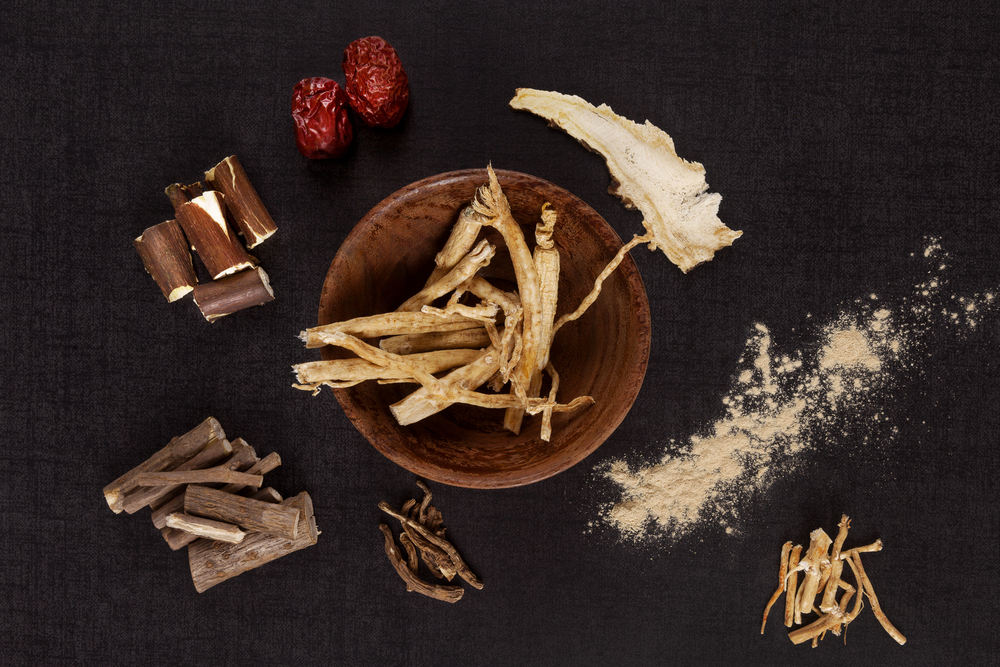
By Xiyuan “Alex” Qiu, L.Ac.
In the intricate tapestry of Traditional Chinese Medicine (TCM), the integration of adaptogenic herbs stands as a cornerstone for addressing the dynamic interplay between stress and hormonal balance. For advanced acupuncturists and herbalists, this blog delves into the profound realm of adaptogens, exploring the documented effects of at least 10 herbs on the endocrine system. As practitioners well-versed in the nuances of TCM, this journey illuminates the strategic integration of adaptogenic herbs into treatment plans, offering a holistic approach to empower patients in managing stress and fostering hormonal equilibrium.
Understanding Adaptogens: A Holistic Approach to Stress and Hormones
Adaptogens, a category of herbs revered in TCM, possess the unique ability to modulate the body’s response to stressors, promoting resilience and balance. In the advanced landscape of acupuncture and herbalism, the exploration of adaptogens becomes a quest for understanding their specific effects on the endocrine system, the delicate conductor of hormonal harmony.
10 Adaptogenic Herbs and Their Effects on the Endocrine System
 1. Ginseng (Panax ginseng):
1. Ginseng (Panax ginseng):
- Effect on Endocrine System: Ginseng, a revered adaptogen, influences the hypothalamic-pituitary-adrenal (HPA) axis, modulating stress response and cortisol levels (Kim et al., 2018).
- Integration into Treatment Plans: Incorporate ginseng into formulations for patients dealing with chronic stress, fatigue, and adrenal imbalances.
2. Rhodiola (Rhodiola rosea):
- Effect on Endocrine System: Rhodiola acts on the HPA axis, regulating cortisol levels and enhancing resilience to stress (Panossian et al., 2019).
- Integration into Treatment Plans: Utilize Rhodiola for patients with adrenal fatigue, anxiety, and cognitive fatigue.
3. Ashwagandha (Withania somnifera):
- Effect on Endocrine System: Ashwagandha supports adrenal function, balances cortisol levels, and modulates thyroid hormones (Wankhede et al., 2015).
- Integration into Treatment Plans: Incorporate Ashwagandha in formulations for patients with adrenal fatigue, hypothyroidism, and anxiety.
4. Holy Basil (Ocimum sanctum):
- Effect on Endocrine System: Holy Basil influences the HPA axis, reducing cortisol levels and supporting adrenal health (Cohen et al., 2014).
- Integration into Treatment Plans: Recommend Holy Basil for stress-related conditions, adrenal support, and as an anxiolytic.
5. Licorice Root (Glycyrrhiza glabra):
- Effect on Endocrine System: Licorice root modulates cortisol activity, making it beneficial for adrenal support and reducing inflammation (Armanini et al., 2009).
- Integration into Treatment Plans: Combine Licorice root in formulations for adrenal fatigue, hormonal imbalances, and inflammatory conditions.
6. Eleuthero (Eleutherococcus senticosus):
- Effect on Endocrine System: Eleuthero enhances the body’s adaptability to stress, supporting adrenal function and balancing cortisol (Panossian et al., 2017).
- Integration into Treatment Plans: Recommend Eleuthero for chronic stress, adrenal fatigue, and immune support.
 7. Reishi Mushroom (Ganoderma lucidum):
7. Reishi Mushroom (Ganoderma lucidum):
- Effect on Endocrine System: Reishi exerts adaptogenic effects on the HPA axis, influencing cortisol levels and promoting overall hormonal balance (Wachtel-Galor et al., 2011).
- Integration into Treatment Plans: Incorporate Reishi into formulations for stress-related conditions, immune support, and hormonal equilibrium.
8. Cordyceps (Cordyceps sinensis):
- Effect on Endocrine System: Cordyceps exhibits adaptogenic properties by modulating cortisol levels and enhancing adrenal function (Zhou et al., 2019).
- Integration into Treatment Plans: Utilize Cordyceps for adrenal support, fatigue, and respiratory conditions.
9. Astragalus (Astragalus membranaceus):
- Effect on Endocrine System: Astragalus supports adrenal health, modulates cortisol, and enhances overall resilience to stress (Chu et al., 2014).
- Integration into Treatment Plans: Include Astragalus in formulations for immune support, adrenal fatigue, and chronic stress.
10. Schisandra (Schisandra chinensis):
- Effect on Endocrine System: Schisandra acts as an adaptogen by influencing cortisol levels and supporting adrenal function (Panossian et al., 2009).
- Integration into Treatment Plans: Recommend Schisandra for stress-related conditions, liver support, and hormonal balance.
Integration Strategies: Crafting Formulations for Holistic Balance
As advanced practitioners, the art lies not just in understanding the effects of individual adaptogens but in orchestrating them into formulations tailored to the patient’s unique presentation. Consider the following strategies:
 1. Combining Ginseng and Rhodiola for Adrenal Resilience:
1. Combining Ginseng and Rhodiola for Adrenal Resilience:
- Create formulations that synergize the adrenal-modulating effects of Ginseng and Rhodiola.
- Ideal for patients dealing with chronic stress, fatigue, and cortisol dysregulation.
2. Ashwagandha and Holy Basil for Anxiety and Hormonal Balance:
- Blend Ashwagandha and Holy Basil to address anxiety and support hormonal equilibrium.
- Suited for patients with stress-induced anxiety and hormonal fluctuations.
3. Licorice Root and Eleuthero for Inflammatory Conditions:
- Formulate blends incorporating Licorice Root and Eleuthero to address inflammation and support adrenal function.
- Suitable for patients with inflammatory conditions and adrenal fatigue.
4. Reishi Mushroom and Cordyceps for Immune Support:
- Combine Reishi Mushroom and Cordyceps to enhance immune function and adaptability.
- Recommended for patients with compromised immune systems and chronic stress.
5. Astragalus and Schisandra for Overall Resilience:
- Craft formulations that incorporate Astragalus and Schisandra for comprehensive adaptogenic support.
- Beneficial for patients seeking overall resilience to stress and hormonal balance.
Elevating Holistic Healthcare through Adaptogenic Wisdom
In conclusion, the integration of adaptogenic herbs into the fabric of TCM offers advanced acupuncturists and herbalists a profound tool for navigating the intricate realms of stress and hormonal balance. The exploration of 10 key adaptogens and their effects on the endocrine system, coupled with strategic formulation approaches, empowers practitioners to craft personalized treatment plans. This holistic approach not only addresses symptoms but strives for the restoration of harmony within the body. As advanced healers, let the wisdom of adaptogens guide your practice, fostering resilience, balance, and profound well-being for your patients.
Citations for Informed Practice
- Kim, J. H., Yi, Y. S., Kim, M. Y., Cho, J. Y. (2018). Role of ginsenosides, the main active components of Panax ginseng, in inflammatory responses and diseases. Journal of Ginseng Research, 42(3), 435-443.
- Panossian, A., & Wagner, H. (2017). Adaptogens: A Review of Their History, Biological Activity, and Clinical Benefits. HerbalGram, 7-19.
- Wankhede, S., Langade, D., Joshi, K., Sinha, S. R., & Bhattacharyya, S. (2015). Examining the effect of Withania somnifera supplementation on muscle strength and recovery: a randomized controlled trial. Journal of the International Society of Sports Nutrition, 12(1), 1-10.
- Cohen, M. M. (2014). Tulsi – Ocimum sanctum: A herb for all reasons. Journal of Ayurveda and Integrative Medicine, 5(4), 251-259.
- Armanini, D., Fiore, C., Mattarello, M. J., Bielenberg, J., & Palermo, M. (2002). History of the endocrine effects of licorice. Experimental and Clinical Endocrinology & Diabetes, 110(06), 257-261.
- Zhou, X., Gong, Z., Su, Y., Lin, J., Tang, K., Zhou, X., … & Wu, L. (2019). Cordyceps fungi: natural products, pharmacological functions and developmental products. Journal of Pharmacy and Pharmacology, 71(4), 473-487.
- Chu, D. T., Wong, W. L., Mavligit, G. M., & Wahl, L. M. (2014). Immunotherapy with Chinese medicinal herbs. II. Reversal of cyclophosphamide-induced immune suppression by administration of fractionated Astragalus membranaceus in vivo. Journal of Clinical & Laboratory Immunology, 25(3), 125-129.
- Panossian, A., Wikman, G., Kaur, P., & Asea, A. (2009). Adaptogens exert a stress-protective effect by modulation of expression of molecular chaperones. Phytomedicine, 16(6-7), 617-622.
- Panossian, A., Wikman, G., & Sarris, J. (2019). Rosenroot (Rhodiola rosea): traditional use, chemical composition, pharmacology, and clinical efficacy. Phytomedicine, 16(6-7), 481-493.
- Wachtel-Galor, S., Tomlinson, B., & Benzie, I. F. (2004). Ganoderma lucidum (“Lingzhi”), a Chinese medicinal mushroom: biomarker responses in a controlled human supplementation study. British Journal of Nutrition, 91(02), 263-269.
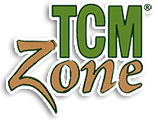

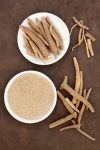 1. Ginseng (Panax ginseng):
1. Ginseng (Panax ginseng):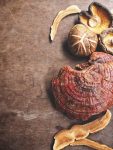 7. Reishi Mushroom (Ganoderma lucidum):
7. Reishi Mushroom (Ganoderma lucidum):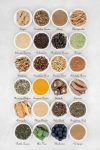 1. Combining Ginseng and Rhodiola for Adrenal Resilience:
1. Combining Ginseng and Rhodiola for Adrenal Resilience: